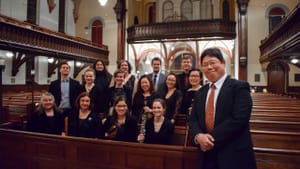Stay in the Loop
BSR publishes on a weekly schedule, with an email newsletter every Wednesday and Thursday morning. There’s no paywall, and subscribing is always free.
Capturing cantatas
Philadelphia Chamber Music Society presents the Gamut Bach Ensemble

Koji Otsuki is a Bach scholar renowned for conducting performances with historical instruments around the world. He has garnered a large following for his Philadelphia-based Gamut Bach Ensemble, filling Rittenhouse’s Church of the Holy Trinity with concerts through the Philadelphia Chamber Music Society for the last few years.
At the ensemble’s December 11 concert with PCMS, featuring the composer’s church cantatas, the rich, deep contralto voice of Sara Couden as she sang of the anticipation of the “sweet hour of death” lulled the audience into deep contemplation. But we lurched back to nervous wakefulness with the sound of tenor Kyle Stegall as he sang of the burden of worldly pleasures. His strained and out-of-tune singing was a burden on the music. The delicate, lyrical descants played on the cello by Paul Wiancko contrasted with Stegall’s efforts to project.
A range of voices
Soprano Sian Ricketts had loud bursts of sound when she entered the higher range of her voice in the “Virga Jesse.” Otsuki chose this fourth interpolation of the 1723 version of the Magnificat in E-flat major, of which only 30 measures survive. The Bach Magnificat we hear today, BWV 243, is in D major and no longer has this extra music, so this was a rare opportunity to hear what Bach’s Leipzig audience heard in 1723. Unfortunately, Jean Bernard Cerin’s powerful but gentle baritone voice was pushed into oblivion by Ricketts’s strident high notes. Still, being able to experience the piece, even imperfectly, gives us a clearer picture of Bach’s music as it was originally performed.
Cerin, a superb soloist, projected his voice without strain for his recitative and aria, and his rounded tones and expressive singing were quite moving.
Successful departure
The stars of this concert were the members of the chamber orchestra. Mary Lynch, principal oboe of the Seattle Symphony, played soft and luscious lines, keeping her modern instrument as gentle as a baroque oboe. The almost extrasensory coordination of Nathaniel West’s double bass and Xiaohui Yang’s cadences on the portable organ was impressive. Violinists Emilie-Anne Gendron and Miho Saegusa and violist Ayane Kozasa played smoothly and were careful to match the vocal lines. The recorder players, Rainer Beckmann and Gwyn Roberts, were stalwart performers of the concert — producing fast and delicate lines and also creating a bell-like staccato that imitated funeral bells.
The four singers sounded much better as a quartet. Singing together, they matched each other’s volume and phrasing. Ricketts’s voice was quiet and steady and Ms. Couden used the softer upper notes of her range, especially in her trio with Stegall and Cerin. In the final cantata, Gottes Zeit ist die allerbeste Zeit, BWV 106 — Actus Tragicus, the range was not in the stratosphere and the blend of voices was very good. As they sang the words mit Fried und Freud ich fahr dahin (with peace and joy I depart), they did as they sang.
What, When, Where
An Evening of Church Cantatas V. Soprano Sian Ricketts; contralto Sara Couden; tenor Kyle Stegall; and baritone Jean Bernard Cerin. Johann Sebastian Bach. The Gamut Bach Ensemble presented by the Philadelphia Chamber Music Society. December 12, 2018, at the Church of the Holy Trinity, 1904 Walnut Street, Philadelphia. (215) 569-8080 or pcmsconcerts.org.
Sign up for our newsletter
All of the week's new articles, all in one place. Sign up for the free weekly BSR newsletters, and don't miss a conversation.

 Margaret Darby
Margaret Darby